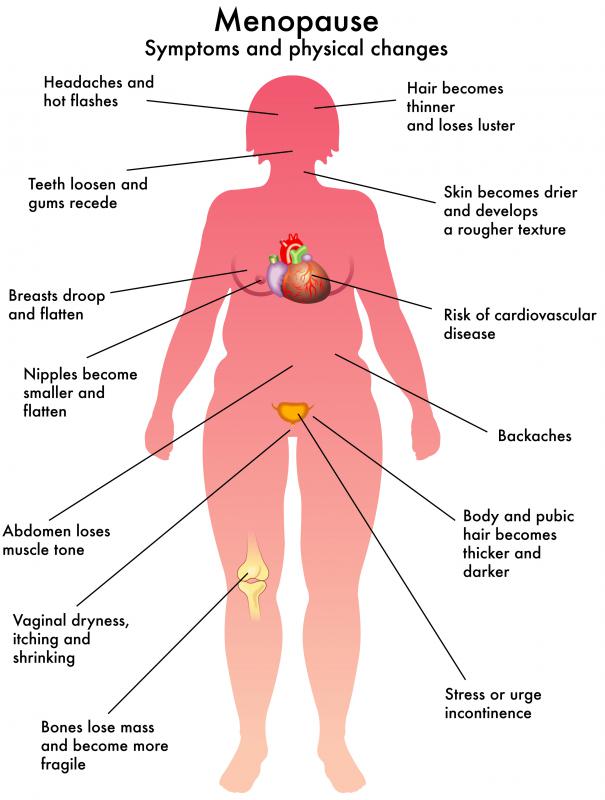At WiseGEEK, we're committed to delivering accurate, trustworthy information. Our expert-authored content is rigorously fact-checked and sourced from credible authorities. Discover how we uphold the highest standards in providing you with reliable knowledge.
What Is the Connection between Estrogen and Hair Loss?
Estrogen and hair loss are connected through the natural hair growth cycle. Thinning hair is a common complaint of women during menopause and is a result of low estrogen levels. Likewise, pregnant women often have longer, fast-growing, thicker hair because of elevated estrogen levels. Hormones, medicines and disease can alter the length of the natural hair growth cycle.
Achieving hormonal balance is difficult for many reasons, especially for women between the ages of 35 and 50. Many women in their mid- to late 30s are overloaded with estrogen. By age 50, estrogen levels decrease by 35 percent, and progesterone levels decrease by 75%. Decreased estrogen and hair loss or thinning hair are common symptoms of menopause.

Estrogen replacement therapy is a common solution for decreased estrogen and hair loss in menopausal women, but the buildup of estrogen over time can lead to a medical condition known as estrogen dominance. This is an extreme imbalance of the two sex hormones, estrogen and progesterone. When estrogen levels are higher than progesterone levels, symptoms might include anxiety, breast tenderness and headaches, as well as irregular bleeding, water retention and weight gain. More serious risks are associated with taking a synthetic estrogen replacement, such as an increased risk for heart disease, breast cancer, blood clots, stroke and dementia.

Oral contraceptives and birth control pills contain estrogen. An initial increase in hair growth — or reduction in hair loss — is usually noticed soon after a woman begins taking birth control pills or estrogen replacement pills. Over time, as estrogen levels stabilize, the natural hair growth cycle is restored. Almost always, it is best for a women to not stop taking the hormone replacements, because this would result in additional hair loss rather than a restoration of hormonal balance. The loss of hair following hormone stimulation is called telogen effluvium (TE).

Classic short-term TE occurs after women given birth. Also called postpartum alopecia, the sudden change in hormone levels sends a shock to the hair follicles, causing them to shut down temporarily. A similar reaction occurs with any estrogen imbalance. Hair loss immediately following pregnancy is another example of the connection between estrogen and hair loss.

Estrogen and hair loss are connected because the natural hair growth cycle is regulated by hormones. Although this is not the primary role of estrogen, it affects bone growth, skin, fat and protein deposition and electrolyte balance. If the effects of estrogen and hair loss are severe, changes in diet and lifestyle can also offer relief. Chemical and food sources of estrogen should be eliminated, stress should be minimized, and exercise is always encouraged. In most cases, normal hair growth returns after the cause is identified and eliminated.
AS FEATURED ON:
AS FEATURED ON:

















Discussion Comments
I'm experiencing hair loss because of an estrogen deficiency. My hair is also very dry, thin and brittle. I have been put on estrogen replacement. Initially, my doctor had me use estrogen patches and then estrogen gel. But neither seemed to be making a difference in terms of hair loss. Now I'm on pills and my hair loss has reduced a little bit but has not stopped completely. So there is definitely a connection between estrogen and hair loss.
@candyquilt-- That's really best answered by your doctor.
Supplementing with estrogen during menopause will definitely help with hair loss and thinning caused by a hormonal imbalance. But even if your doctor approves estrogen therapy for this purpose, she is unlikely to allow you to stay on the therapy for a long time. Even if estrogen and progesterone are in balance, you may experience issues with estrogen supplementation.
Like the article said, high estrogen levels can lead to blood clots and there is some evidence that it can increase the risk of cancer. So whether to get estrogen therapy during menopause for hair loss or not is a decision that you need to take with your doctor after careful deliberation. Consider the risks and benefits.
Some hormone replacement therapies used during menopause include a combination of estrogen and progesterone. So I guess in order to prevent hair thinning during menopause, as well as estrogen dominance, this type of therapy should be used?
Post your comments